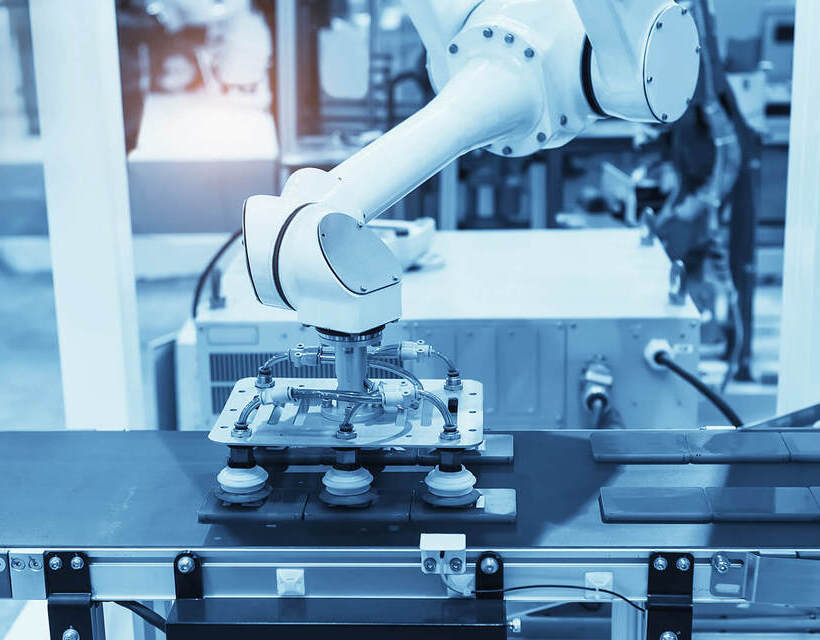Manufacturing is an ever-changing industry that requires constant innovation to stay ahead of the competition. Did you know that global spending on emerging manufacturing technologies is estimated to reach $1.3 trillion by 2021?
That's a huge growth rate, and it's no surprise as manufacturers look for new ways to remain competitive in this dynamic market.
It can be overwhelming trying to keep up with all the new technologies available, but don't worry - we're here to help! In this article, we'll explore the growth trends of emerging manufacturing technologies like Automation, 3D Printing, Data Analytics, Cloud Computing, Internet of Things and Augmented Reality.
With our guidance, you can make sure your business takes advantage of these advancements and stays at the top of its game.
Overview of Emerging Technologies

Emerging technologies are revolutionizing the manufacturing industry, allowing for unprecedented production speeds and capabilities - it's an exciting time!
We're seeing a world of possibilities in which robots, artificial intelligence (AI), automation, 3D printers, nanotechnology, and blockchain technology are all playing a part.
Businesses can now produce goods faster than ever before with fewer resources and at lower costs. This is bringing about a new era of innovation that will shape the future of the industry.
With these incredible advances comes increased efficiency and productivity, as well as improved product quality and better customer satisfaction.
The ability to leverage these emerging technologies will help manufacturers gain a competitive edge in their markets and build long-term success.
It's no wonder that so many companies are investing heavily in emerging technologies; they offer tremendous opportunities for growth and profitability.
Automation
Automation is a key element to the success of emerging manufacturing technologies. It has been used in different industries, including the automotive, aerospace, and even medical sectors, for decades.
Automation can be used to automate certain processes such as assembly, welding, or inspection. This helps reduce costs and increase productivity by eliminating tedious manual labor. Moreover, it reduces human errors since machines are usually more accurate than humans in repetitive tasks.
As a result of its efficiency and accuracy, automation has become an essential tool in manufacturing processes worldwide. The introduction of artificial intelligence and robotics into automated systems further improves their potential for growth and development in the future.
AI-enhanced robots are able to learn from past experiences and adapt accordingly; this means they can take on more complex tasks with greater precision than ever before. With advances in machine learning algorithms, these robots will become increasingly intelligent over time – meaning that manufacturers can reap the benefits of increased throughput without having to invest heavily in human labor.
Automation offers great opportunities for growth and advancement within emerging manufacturing technologies: it not only boosts production capabilities but also allows companies to save money while maintaining quality standards at all times - creating a win-win situation for everyone involved!
3D Printing

You can now use 3D printing to quickly and easily create complex objects with intricate designs. It has become one of the most important emerging technologies in recent years. From the medical field to the manufacturing sector, 3D printing technology is revolutionizing the way we make products.
With a variety of materials ranging from plastic to metals, you can now print almost anything you can imagine. This means that businesses have access to a wide range of possibilities when it comes to creating objects that are both durable and aesthetically pleasing. The cost savings associated with this type of manufacturing is also significant, as it eliminates costly labor costs and reduces lead times for product delivery.
Additionally, 3D printing allows for customization options which can increase customer satisfaction and loyalty. As its popularity continues to rise, organizations will continue to benefit from its widespread capabilities and potential applications in various sectors.
Data Analytics
Data analytics is revolutionizing the way businesses make decisions, allowing them to gain better insights into their customer base and operations. By leveraging data analytics, companies can analyze massive amounts of data to identify trends and relationships that may otherwise be difficult to detect.
This helps them develop more accurate forecasts and predictions or create better products and services for customers. Utilizing powerful computer algorithms, they can generate deeper insights into consumer behavior, empowering them with the ability to anticipate customer demands and make smarter business decisions that are tailored specifically for their target market.
With data analytics, businesses have the potential to gain an unprecedented level of efficiency in manufacturing technologies and increase outcomes while minimizing costs.
Cloud Computing
You're not alone in feeling overwhelmed by the complexity of emerging manufacturing technologies. Cloud computing is here to simplify things for you. It has revolutionized the way businesses access, store, and share data, making it possible for them to quickly scale their resources without needing to invest in additional hardware.
Cloud computing also offers a number of advantages:
- Increased efficiency as computing tasks can be completed faster thanks to increased processing power;
- Reduced costs as there's no need to purchase or maintain physical servers;
- Increased flexibility as applications and services can be accessed from anywhere at any time.
These benefits are helping manufacturers stay competitive and make better use of their resources. By leveraging cloud technology, companies can easily keep up with changing trends and remain agile in a rapidly changing business environment.
Plus, cloud-based solutions enable organizations to build resilient systems that are secure and reliable—allowing them to focus on growth instead of worrying about technological issues.
With so many advantages, you can see why cloud computing is becoming increasingly popular in the manufacturing industry!
Internet of Things
As you transition from cloud computing to the Internet of Things, you may be wondering what impact this technology will have on the manufacturing industry. Well, you're not alone in that curiosity!
IoT is one of the most cutting-edge technologies out there and it promises to revolutionize manufacturing processes. IoT allows various types of connected devices to communicate with each other over a network, allowing manufacturers to automate many tasks and make their operations more efficient.
This translates into cost savings, improved accuracy and quality control, greater safety for workers, and an increase in production output — all thanks to IoT!
With such advantages, it's no wonder that many experts are predicting explosive growth for emerging manufacturing technologies like IoT.
Augmented Reality
Augmented reality is revolutionizing the way manufacturers interact with their products and processes, giving them more control over quality assurance and output. By leveraging AR technology, manufacturers can quickly identify potential defects in their process or products before they reach the customer.
They're also able to monitor production systems from remote locations to ensure that they're running efficiently and safely. This technology also allows for faster troubleshooting of any issues that may arise during the manufacturing process. With this level of control, manufacturers are able to maximize efficiency while still providing customers with quality products.
The use of AR in manufacturing is growing at a rapid rate, as more companies recognize its potential for streamlining production processes and increasing safety standards. Augmented reality offers a unique opportunity for manufacturers to create better experiences for their customers by providing them with real-time feedback on product performance and accuracy.
As this trend continues to grow, we'll likely see even greater improvements in production throughput and quality assurance as AR technology becomes more widely adopted across industries.
Trends and Forecasts
As the manufacturing industry continues to evolve, emerging technologies are having a profound impact on how goods and services are produced. Businesses are increasingly adapting these technologies as they recognize opportunities for improvement in efficiency and cost-effectiveness. However, there is also the challenge of implementing new processes and overcoming potential risks associated with adopting them.
By exploring trends and forecasts related to emerging manufacturing technologies, you can gain greater insight into this dynamic situation.
Impact of Emerging Technologies on the Manufacturing Industry

You're seeing the manufacturing industry shift with the introduction of emerging technologies, creating changes you couldn't have anticipated.
From advanced robotics and automation that help streamline operations to 3D printing and additive manufacturing that reduce production costs, a variety of new technologies are revolutionizing how manufacturers create their products.
These breakthroughs in technology are having a profound impact on the way businesses operate:
- Increased Productivity:
- Automation is leading to increased efficiency, allowing manufacturers to produce more with less effort.
- Robotics enables companies to automate mundane tasks, freeing up workers for more high-value activities.
- Improved Quality:
- Advanced analytics helps identify potential problems before they occur, resulting in higher quality products.
- 3D printing and additive manufacturing make it easier for manufacturers to produce complex parts with fewer defects.
These technological advances are not only transforming how products are made but also providing new opportunities for growth and innovation in the manufacturing industry.
Adoption of Emerging Technologies
With the promise of enhanced efficiency and quality, it's no surprise that manufacturers are rapidly embracing emerging technologies to stay ahead of the curve. From artificial intelligence (AI) to robotics and 3D printing, technology is transforming the way products are made.
Such technologies offer many advantages, from faster lead times and better process control to increased production flexibility. This means that companies can now automate jobs with greater precision and accuracy while eliminating labor costs associated with manual processes.
Furthermore, emerging technologies enable manufacturers to increase their competitive advantage by developing custom-made solutions tailored to their specific needs. Companies can also use data collected through such technologies to make informed decisions about product design and refine operational processes for improved efficiency.
By taking full advantage of these innovative tools, businesses can gain a huge edge in an ever-evolving market landscape.
Challenges and Opportunities of Emerging Technologies
Discover how emerging technologies can bring both challenges and opportunities to your manufacturing business. As you incorporate new techniques into the production process, you may find yourself running into problems such as inadequate equipment, lack of knowledge or experience with digital tools, and difficulty training employees on the new technology.
These challenges can be difficult to manage, but they also open up the potential for great rewards if addressed properly. With newfound possibilities such as faster production times and more efficient processes, embracing emerging technologies can give your business an edge in today's competitive market.
Moreover, investing in updated machines and software will also make your company look more attractive to future customers and partners by showing that you're up-to-date with current trends. By taking care of the unique issues associated with adopting new technologies while still taking advantage of their benefits, you can ensure that your organization is well-positioned for future success.
Conclusion
In conclusion, emerging technologies are revolutionizing the manufacturing industry. Automation, 3D Printing, Data Analytics, Cloud Computing, Internet of Things, and Augmented Reality are pushing the boundaries of innovation.
The future of manufacturing is bright as these technologies continue to soar in popularity and shape the way products are created. Forecasting has given us a glimpse into what's to come; one thing we know for certain is that these advancements will bring forth a new world of possibilities and plentiful profits.
So, embrace the emerging technologies; they offer an abundance of opportunities to grow and become more productive than ever before!
